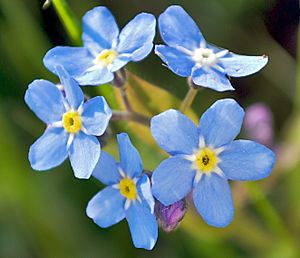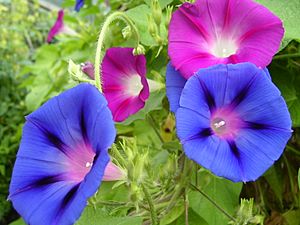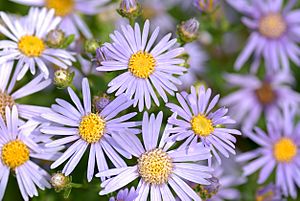September facts for kids
September is the ninth month of the year. It has 30 days. Both the Gregorian calendar (which most of the world uses today) and the older Julian calendar use September as the ninth month.
In the Northern Hemisphere, September marks the start of autumn. This is when leaves begin to change color and the weather gets cooler. In the Southern Hemisphere, it's the start of spring, and flowers begin to bloom.
For many students in the Northern Hemisphere, September means going back to school after the long summer break. It's often the start of a new school year.
If you were born in September, your zodiac sign is either Virgo (if you were born between September 1st and 22nd) or Libra (if you were born between September 23rd and 30th).
The name "September" comes from the Latin word septem, which means "seven." This is because September was originally the seventh month in the very old Roman calendar. Back then, the year started in March. Later, January and February were added to the beginning of the year, making September the ninth month, but it kept its original name.
Contents
History of September
September has a rich history with different names and traditions.
Ancient Times
In ancient Rome, people celebrated various festivals in September. For example, the Ludi Romani were big games and shows held in honor of the god Jupiter. These celebrations could last for many days.
Throughout history, September has been known by different names. In Charlemagne's time, it was called "harvest month" because it was when many crops were gathered. The Anglo-Saxons, who lived in England a long time ago, called it Gerstmonath, meaning "barley month," as barley was often harvested then.
Calendar Changes
A big change happened in 1752 when the British Empire (which included many countries like the United States before its independence) switched to the Gregorian calendar. To make this change, some days were skipped! So, in September 1752, September 2nd was immediately followed by September 14th. Imagine going to bed on September 2nd and waking up on September 14th!
Birthdays in September
In the United States, September is a very popular month for birthdays. Many of the most common birthdays fall in September. For example, September 9th is often the most common birthday!
September in the Sky
September is an important month for understanding the Earth's journey around the Sun.
The Equinox
The September equinox happens in this month, usually between September 21st and 24th. An equinox is when the day and night are almost exactly equal in length all over the world.
In the Northern Hemisphere, this is the Autumn Equinox, marking the start of fall. In the Southern Hemisphere, it's the Vernal Equinox, marking the start of spring.
Symbols of September
Each month has special symbols, and September is no different!
Birthstone
September's birthstone is the beautiful sapphire. Sapphires are known for their deep blue color, but they can come in other colors too.
Birth Flowers
The birth flowers for September are the forget-me-not, morning glory, and aster.
Special Days in September
September is filled with many holidays and observances around the world. Here are some of them:
Month-Long Observances
- Childhood Cancer Awareness Month (United Kingdom)
- National Suicide Prevention Month
- National Preparedness Month (United States) - This month helps people get ready for emergencies.
Movable Dates
Some observances don't fall on the same date every year but move around within September.
- Labour Day (First Monday in September) - Celebrated in countries like Canada and the United States, this day honors workers.
- Father's Day (First Sunday in September) - Celebrated in countries like Australia and New Zealand.
- National Grandparents' Day (Second Sunday in September) - Celebrated in countries like Canada and the United States, this day honors grandparents.
- Oktoberfest celebrations (Third Saturday in September) - A famous German festival that begins in September.
- Software Freedom Day (Third Saturday in September) - An international day to celebrate free and open-source software.
- Banned Books Week (Last week in September) - An international event celebrating the freedom to read and highlighting books that have been challenged or banned.
Fixed Dates
Many countries celebrate important days on specific dates in September.
- September 1
- September 2
- National Day (Vietnam) - Celebrates Vietnam's independence.
- September 7
- Independence Day (Brazil) - Celebrates Brazil's independence.
- September 8
- International Literacy Day - Promotes the importance of reading and writing worldwide.
- September 10
- World Suicide Prevention Day - Raises awareness about suicide prevention.
- September 11
- Patriot Day (United States) - A day of remembrance for the victims of the 9/11 attacks.
- September 15
- Independence Day - Celebrated by several Central American countries like Guatemala and Costa Rica.
- International Day of Democracy - Promotes democratic principles around the world.
- September 16
- Grito de Dolores (Mexico) - Marks the start of the Mexican War of Independence.
- Malaysia Day (Malaysia) - Celebrates the formation of Malaysia.
- September 17
- Constitution Day (United States) - Celebrates the signing of the U.S. Constitution.
- September 19
- International Talk Like a Pirate Day - A fun, unofficial holiday where people talk like pirates!
- September 21
- Independence Day - Celebrated by countries like Armenia and Belize.
- International Day of Peace - A day for global ceasefire and non-violence.
- September 22
- Hobbit Day - Celebrated by fans of J.R.R. Tolkien's books, as it's the birthday of Bilbo and Frodo Baggins.
- September 23
- Saudi National Day (Saudi Arabia) - Celebrates the unification of the Kingdom of Saudi Arabia.
- September 24
- Heritage Day (South Africa) - Celebrates the diverse cultures and traditions of South Africa.
- September 26
- European Day of Languages (European Union) - Promotes language learning and linguistic diversity.
- September 27
- World Tourism Day - Promotes tourism and its benefits.
- September 28
- World Rabies Day - Raises awareness about rabies prevention.
- September 29
- World Heart Day - Promotes heart health and awareness of heart disease.
- September 30
- Independence Day (Botswana) - Celebrates Botswana's independence.
- International Translation Day - Honors the work of translators.
Images for kids
See also
 In Spanish: Septiembre para niños
In Spanish: Septiembre para niños
 | Claudette Colvin |
 | Myrlie Evers-Williams |
 | Alberta Odell Jones |









